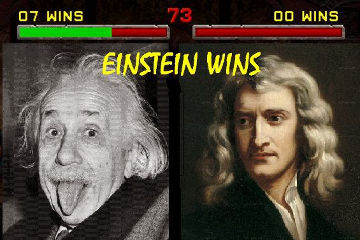What I’ve Learned:
Relativity: you can’t choose your family, but you can pick your physics.
I’ve learned a little about the theory — actually, theories — of relativity.
(Obviously only “a little”; I’ve never learned a lot about anything.)
Of course, I got a little confused about the word “relativity”. Seeing as how it sounds like “relatives”, I initially thought the physics professor was talking about my family. The parallels are so strong, in fact, it took me three lectures to figure out the problem. Maybe your relatives are different. Judge for yourself:
First, there are two kinds. You’ve got “general” relativity, and then there’s relativity that’s… “special”. Like Aunt Eunice, who leaves her girdle by the table after family dinners. Or cousin Gene, whose clan has watched “A Christmas Story” several thousand too many times.
(Apparently, there’s now a new-ish thing called “doubly special relativity” or “extra-special relativity”. Some physicists must have talked to Nana after her three helpings of rum fruitcake.)
Just as families make no sense, neither do the two names for types of relativity. “General” relativity actually only covers one specific thing: gravity. I thought this meant the gravitation of parents and grandparents around you when you visit for Christmas, asking things like, “You’re not wearing that, are you?” And “When are you going to find a job?” And “Who ate all my damned fruitcake?”
I found out later it was a different kind of gravitation, and apparently it doesn’t work the way Isaac Newton or anyone else thought it did. The way Einstein figured gravity led to some pretty oddball predictions about the universe: spacetime must be curved rather than consistent, gravity can slow time and bend light, and black holes could exist that suck up all matter and light nearby.
These were all pretty outlandish notions when they were hypothesized back in the early 20th century. But as we’ve sorted out ways to precisely measure and explore such things, they’ve all turned out to be real. Who’s loopy on fruitcake now, classical physicists?
Of course, that leaves “special” relativity to explain everything else — a common occurrence at my family’s holiday parties. If you want to hear what’s wrong with kids today, where you ought to put your money or how the “gubment” ought to be run, just pull up a chair (and a tall stiff eggnog) and listen to the “special” relatives dish out a dose of “wisdom”.
(Naturally, they know as much about these topics as I know about… well, science. Which is scary. I’m surprised most of them manage to put on their pants in the morning.)
As I’ve mentioned before, special relativity isn’t about such things, though. (Thank goodness.) Instead, it’s a description of how spacetime — the woven-together fabric of time and three-dimensional space — works, and how things we used to believe were fundamental actually change based on perspective. Like an event happening at the same time according to two people, but sometime else to an observer in relative motion. Time slows down and objects seem shorter, the faster they go. And the big one that ties mass and energy and the speed of light (squared) all together: E = mc2.
Physicists glommed onto special relativity soon after Einstein first proposed it in 1905, because it fit with certain experimental observations better than Newton’s old laws — and it was useful in the bizarro, whacked-out, very “special relative” worlds of nuclear physics and quantum mechanics. General relativity took longer, but finding black holes and pulsars and other weird cosmic schmutz it predicted helped to solidify it, too.
So relativity isn’t about relatives, really. But a lot of it is strange, much of it is “special”, and most of it is, like, a hundred years old. So it’s really not that different. And it’s all around us in the form of spacetime and gravitation, so keep an eye out for relativity at your family gatherings over the holidays.
Just watch out for Nana. She’s a mean fruitcake drunk.



